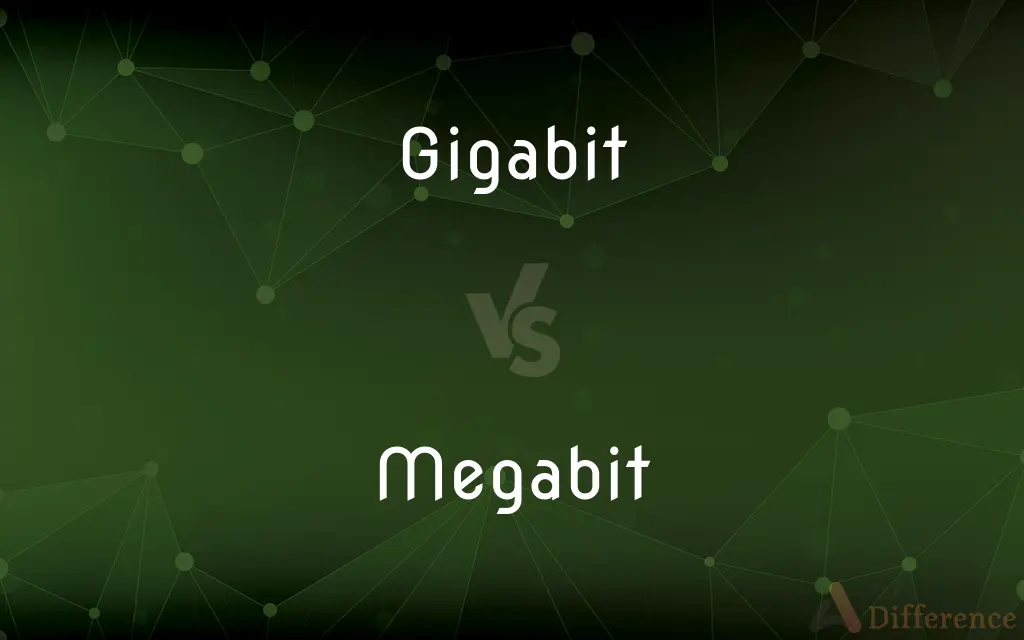Gigabit vs. Megabit — What's the Difference?
By Tayyaba Rehman — Updated on November 7, 2023
A gigabit is 1,000 megabits; they measure digital data, with gigabit being the larger unit.

Difference Between Gigabit and Megabit
Table of Contents
ADVERTISEMENT
Key Differences
Gigabits and megabits are both units of digital information. A gigabit is a term used to denote a larger amount of digital data compared to a megabit. Specifically, one gigabit is equivalent to 1,000 megabits. When measuring network speeds or data transfer rates, gigabits are often used for faster connections.
Megabits, while smaller than gigabits, are still a common measurement for data. They are especially prevalent in describing slower internet connection speeds. Although gigabits are becoming more standard due to increasing speed requirements, megabits are still widely referenced in many parts of the world.
Gigabit speeds are sought after in modern telecommunications, signifying a higher capacity for data transmission. When an internet service provider offers gigabit speeds, it indicates a more robust and faster service. Conversely, megabit speeds, though adequate for many tasks, represent slower connections.
In the context of storage, both gigabits and megabits are less commonly used, as bytes are the preferred unit. However, when they are used, it’s important to note that one gigabit equals 125 megabytes, and one megabit equals 0.125 megabytes, since there are 8 bits in a byte.
While both gigabits and megabits measure data, their usage varies with technology. Gigabit is increasingly becoming a standard descriptor of network capacity in the era of high-definition streaming and online gaming. Megabit, on the other hand, still maintains relevance for many types of internet activities and service levels.
ADVERTISEMENT
Comparison Chart
Quantity
1 gigabit = 1,000 megabits
1 megabit = 0.001 gigabits
Data Transfer
Used for higher-speed connections
Used for standard-speed connections
Symbol
Gb
Mb
Relevance
Increasing with high-speed internet
Maintains with average-speed services
Usage
Associated with faster download/upload rates
Associated with slower download/upload rates
Compare with Definitions
Gigabit
A gigabit is a unit of digital information equal to 1,000 megabits.
My internet plan offers 1 gigabit per second download speeds.
Megabit
A megabit is a unit of digital information equal to 1/1,000 of a gigabit.
My internet connection peaks at 50 megabits per second.
Gigabit
Gigabit can denote network hardware capabilities, such as routers.
This router supports gigabit speeds for efficient home networking.
Megabit
Megabit is often used to describe standard internet connection speeds.
Residential internet speeds are usually measured in megabits.
Gigabit
Gigabit refers to data transfer rates commonly used for high-speed internet services.
Companies are now offering gigabit ethernet to accommodate faster networks.
Megabit
In terms of data volume, a megabit is a smaller unit than a gigabit.
I need to download a file that is several hundred megabits in size.
Gigabit
The term gigabit is symbolic of advanced technology in digital communication.
We're installing gigabit fiber to improve our data infrastructure.
Megabit
Megabit describes digital storage or transmission capacity less than gigabit.
Older network hardware often has a maximum throughput of 100 megabits per second.
Gigabit
In data measurement, a gigabit represents a substantial amount of data.
Transferring a gigabit of data can be done in seconds on a good connection.
Megabit
Megabit also indicates the data transfer capability of some networks.
The wireless network operates at 24 megabits per second.
Gigabit
The gigabit is a multiple of the unit bit for digital information or computer storage. The prefix giga (symbol G) is defined in the International System of Units (SI) as a multiplier of 109 (1 billion, short scale), and therefore.
Megabit
The megabit is a multiple of the unit bit for digital information. The prefix mega (symbol M) is defined in the International System of Units (SI) as a multiplier of 106 (1 million), and therefore 1 megabit = 106bits = 1000000bits = 1000 kilobits.The megabit has the unit symbol Mbit.
Gigabit
A unit of information equal to one thousand million (10⁹) or (strictly) 2³⁰ bits.
Megabit
A unit of data size or (when expressed per second) network speed, equal to one million or (strictly) 1,048,576 bits.
Gigabit
One billion bits.
Megabit
One million bits.
Gigabit
1,073,741,824 (230) bits.
Megabit
1,048,576 (220) bits.
Gigabit
(computing) One billion (109, or 1,000,000,000) bits or 1,000 megabits.
Megabit
(computing) One million (106, or 1,000,000) bits or 1,000 kilobits. Equals 125,000 bytes (125 kilobytes).
Gigabit
A gibibit.
Megabit
(computing) a mebibit.
Megabit
One megabit per second
Megabit
One million bits
Common Curiosities
What is a gigabit?
A gigabit is a unit of digital information or data transfer rate equal to 1,000 megabits.
Is gigabit faster than megabit?
Yes, gigabit represents a speed or amount of data that is 1,000 times larger than what megabit represents.
How many megabits are there in a gigabit?
There are 1,000 megabits in one gigabit.
Can I convert gigabits to megabits?
Yes, you can convert gigabits to megabits by multiplying the number of gigabits by 1,000.
What does Mbps stand for?
Mbps stands for megabits per second and is a rate of data transfer.
What does Gbps stand for?
Gbps stands for gigabits per second, also a rate of data transfer, but significantly faster than Mbps.
Are gigabits and megabits used for data storage measurements?
They can be used but are less common than bytes for data storage; bits are more common for data transfer rates.
When are gigabits used?
Gigabits are used when referring to high-speed internet connections or the transfer of large amounts of data.
Do I need gigabit speeds at home?
It depends on your internet usage; gigabit speeds are beneficial for heavy streaming, gaming, and large downloads.
Can network equipment be described in gigabits?
Yes, network equipment like routers and switches can be described in gigabits based on their maximum transfer speeds.
Are gigabit internet plans more expensive than megabit plans?
Generally, gigabit internet plans are more expensive due to the higher speed and data capacity.
Is there a visual difference in performance between gigabit and megabit?
Yes, the visual difference can be seen in faster load times and smoother streaming with gigabit speeds.
What is a typical use for a megabit speed?
Megabit speeds are typical for basic internet usage like web browsing and standard-definition video streaming.
What is the real-world difference between gigabit and megabit?
In real-world usage, gigabit speeds allow for much quicker downloads and smoother streaming of high-definition content compared to megabit speeds.
Will a gigabit network make my internet faster?
If your internet service plan provides gigabit speeds, and your equipment is gigabit-capable, then yes, your internet will be faster.
Share Your Discovery

Previous Comparison
Prudence vs. Prudent
Next Comparison
Apolipoprotein vs. ApoproteinAuthor Spotlight
Written by
Tayyaba RehmanTayyaba Rehman is a distinguished writer, currently serving as a primary contributor to askdifference.com. As a researcher in semantics and etymology, Tayyaba's passion for the complexity of languages and their distinctions has found a perfect home on the platform. Tayyaba delves into the intricacies of language, distinguishing between commonly confused words and phrases, thereby providing clarity for readers worldwide.
















































